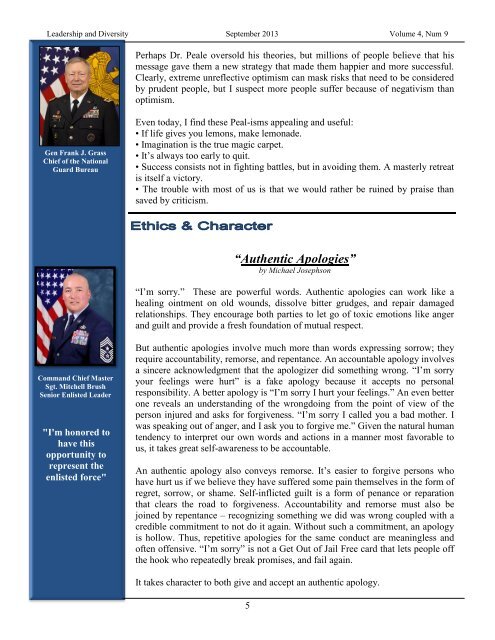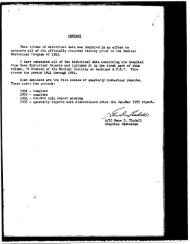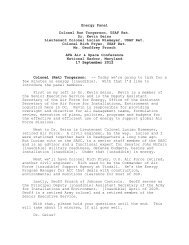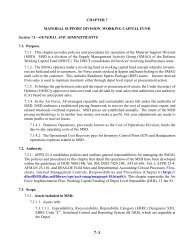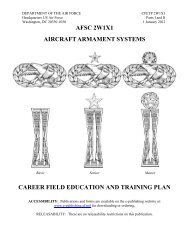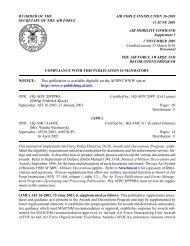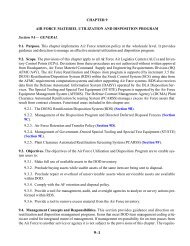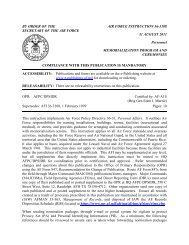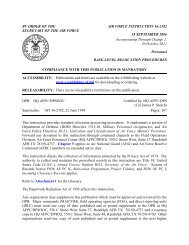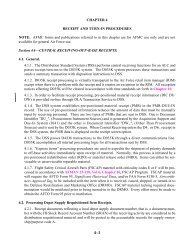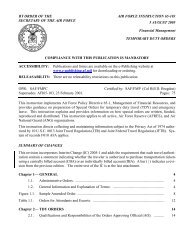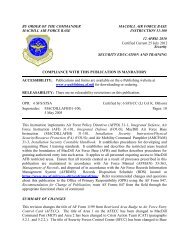Leadership and Diversity Newsletter September - Air Force Link
Leadership and Diversity Newsletter September - Air Force Link
Leadership and Diversity Newsletter September - Air Force Link
You also want an ePaper? Increase the reach of your titles
YUMPU automatically turns print PDFs into web optimized ePapers that Google loves.
<strong>Leadership</strong> <strong>and</strong> <strong>Diversity</strong> <strong>September</strong> 2013 Volume 4, Num 9<br />
Perhaps Dr. Peale oversold his theories, but millions of people believe that his<br />
message gave them a new strategy that made them happier <strong>and</strong> more successful.<br />
Clearly, extreme unreflective optimism can mask risks that need to be considered<br />
by prudent people, but I suspect more people suffer because of negativism than<br />
optimism.<br />
Gen Frank J. Grass<br />
Chief of the National<br />
Guard Bureau<br />
Even today, I find these Peal-isms appealing <strong>and</strong> useful:<br />
• If life gives you lemons, make lemonade.<br />
• Imagination is the true magic carpet.<br />
• It’s always too early to quit.<br />
• Success consists not in fighting battles, but in avoiding them. A masterly retreat<br />
is itself a victory.<br />
• The trouble with most of us is that we would rather be ruined by praise than<br />
saved by criticism.<br />
“Authentic Apologies”<br />
by Michael Josephson<br />
“I’m sorry.” These are powerful words. Authentic apologies can work like a<br />
healing ointment on old wounds, dissolve bitter grudges, <strong>and</strong> repair damaged<br />
relationships. They encourage both parties to let go of toxic emotions like anger<br />
<strong>and</strong> guilt <strong>and</strong> provide a fresh foundation of mutual respect.<br />
Comm<strong>and</strong> Chief Master<br />
Sgt. Mitchell Brush<br />
Senior Enlisted Leader<br />
"I'm honored to<br />
have this<br />
opportunity to<br />
represent the<br />
enlisted force"<br />
But authentic apologies involve much more than words expressing sorrow; they<br />
require accountability, remorse, <strong>and</strong> repentance. An accountable apology involves<br />
a sincere acknowledgment that the apologizer did something wrong. “I’m sorry<br />
your feelings were hurt” is a fake apology because it accepts no personal<br />
responsibility. A better apology is “I’m sorry I hurt your feelings.” An even better<br />
one reveals an underst<strong>and</strong>ing of the wrongdoing from the point of view of the<br />
person injured <strong>and</strong> asks for forgiveness. “I’m sorry I called you a bad mother. I<br />
was speaking out of anger, <strong>and</strong> I ask you to forgive me.” Given the natural human<br />
tendency to interpret our own words <strong>and</strong> actions in a manner most favorable to<br />
us, it takes great self-awareness to be accountable.<br />
An authentic apology also conveys remorse. It’s easier to forgive persons who<br />
have hurt us if we believe they have suffered some pain themselves in the form of<br />
regret, sorrow, or shame. Self-inflicted guilt is a form of penance or reparation<br />
that clears the road to forgiveness. Accountability <strong>and</strong> remorse must also be<br />
joined by repentance – recognizing something we did was wrong coupled with a<br />
credible commitment to not do it again. Without such a commitment, an apology<br />
is hollow. Thus, repetitive apologies for the same conduct are meaningless <strong>and</strong><br />
often offensive. “I’m sorry” is not a Get Out of Jail Free card that lets people off<br />
the hook who repeatedly break promises, <strong>and</strong> fail again.<br />
It takes character to both give <strong>and</strong> accept an authentic apology.<br />
5


